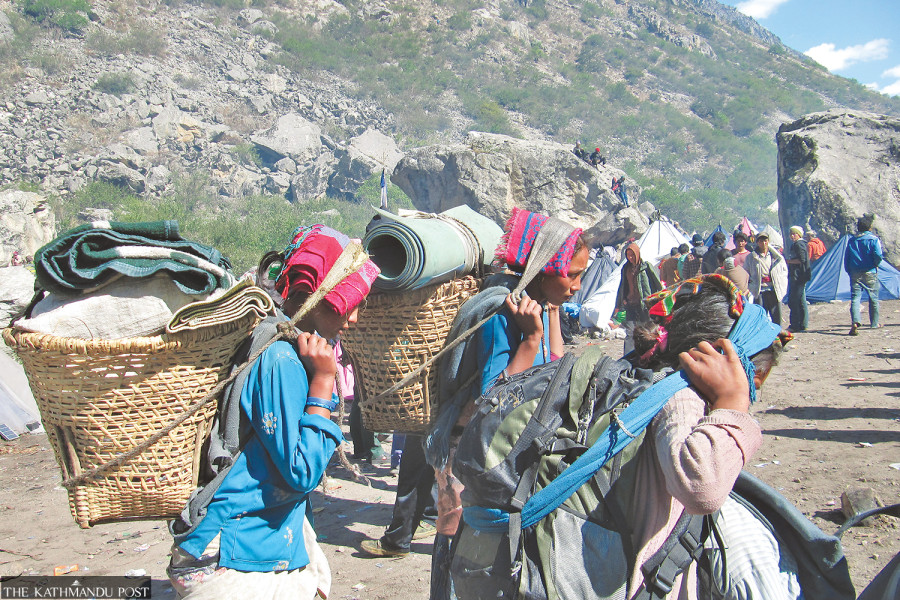National
Illegal yarsa collectors taking risky routes to mountain grasslands give officials headache
74 people have been nabbed in a month for using restricted and prohibited routes inside Shey Phoksundo National Park.
Raj Bahadur Shahi
With the yarsagumba harvest season kicking off in the highlands of northern districts, many people are taking illegal shortcut routes to get there ahead of schedule and to avoid paying fees for permit fees.
Yarsagumba (Ophiocordyceps sinensis) is a caterpillar fungus prized for its purported medicinal properties.
In just one month, officials have arrested and fined 74 collectors for using restricted and prohibited routes inside the Shey Phoksundo National Park.
Yarsa is found in decent quantities in 32 areas, including seven forest areas of Mugum Karmarong Rural Municipality, Mugu, and 25 areas of Shey Phoksundo National Park in Dolpa.
According to Bishwababu Shrestha, senior conservation officer of the Shey Phoksundo National Park, permits were issued to collectors only on May 23 to start their treks to the highlands of Dolpa using the traditional routes. Similarly, permits were issued to collectors to start their journey to the Mugu highlands only on May 28. But many others without permits are using illegal routes.
Shey Phoksundo National Park is the largest and only trans-Himalayan national park in Nepal, and it is spread over Mugu and Dolpa. Park officials are having difficulties in carrying out their regular duties because of the trespassers.
Yarsagumba is a parasitic fungus that grows within a variety of moth caterpillars in grasslands high in the Himalayan region. Locally called yarsa, in short, the fungus kills the caterpillar and emerges from the dead body as a thin stem. Yarsagumba is in high demand in a number of countries in East Asia, particularly China.
Yarsagumba fetches up to Rs1.8 million per kilo in Mugu, and up to Rs2 million in Dolpa district.
Shrestha said that the entrance to the highlands is not open, but 74 people were going to the highlands through mountain trails, which require special permission to travel due to various risk factors.
“The number of people using illegal shortcuts to reach the highlands, ignoring the risks, is increasing. On Thursday, a 19-year-old man on his way to the uplands through an illegal route died of altitude sickness,” said Shrestha.
The collectors using illegal routes are mostly from outside Mugu and Dolpa districts.
In order to go to the highlands to collect yarsa, one has to acquire permission from the local unit where the collection area is located, and in the context of Dolpa, one has to acquire permission from the park or the Division Forest Office.
Most of the collectors use illegal routes, risking their lives to reach the highlands early in their attempt to harvest more yarsa and earn more.
The locals of Mugu and Dolpa can acquire permission by paying Rs2,500 per person, and collectors from outside the district have to pay Rs3,000 per person.
Tsering Kyanpe Lama, chairman of Mugum Karmarong Rural Municipality, said that despite their repeated efforts, the number of people going to the highlands without acquiring permission, is increasing.
Most of those found in the lower altitudes without permit are turned back without any action, but those found in the highlands are arrested and fined.
“Most of the people arrested using illegal means and without permission were from Jumla. The traditional route for the highlands is through the banks of the Karnali River, which takes three to four days to reach the highlands and more if the weather is bad,” said Lama. “Last year, around 9,000 people went to the highlands to collect yarsa, and two people died due to altitude sickness. We don’t have exact information about people who get lost in the highlands or die, because around 300 to 400 people go to the highlands without obtaining permission or registering themselves,” Lama added.
Shrestha said that the security personnel of the park are having difficulties controlling the people using the illegal routes.
“The local units of both districts have also deployed people along with police to tackle trespassing and to verify permits, but due to the huge influx of people, mainly from outside the district, everybody is having difficulties controlling them,” said Shrestha. "There are countless routes in the mountains to reach the highlands, and due to a lack of manpower, we cannot cover them all," Shrestha added.




 14.12°C Kathmandu
14.12°C Kathmandu.jpg)














